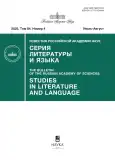The Archetype of Maiden Warrior in the Dramas of Friedrich Schiller, Johann Wolfgang von Goethe and Heinrich von Kleist
- 作者: Finogenov V.A.1
-
隶属关系:
- Institute of Scientific Information for Social Sciences of the Russian Academy of Sciences
- 期: 卷 84, 编号 4 (2025)
- 页面: 87-104
- 栏目: Articles
- URL: https://journal-vniispk.ru/1605-7880/article/view/322642
- DOI: https://doi.org/10.31857/S1605788025040083
- ID: 322642
详细
The article examines the archetype of Maiden Warrior in the dramaturgy of Friedrich Schiller, Johann Wolfgang von Goethe and Heinrich von Kleist. Three writers’ views on the role of the female sex in the structure of society reflected a commitment to the “traditional values” of that time. Why, in their dramas, do they come to the archetype of the Amazon, which is exactly the opposite of the female ideal nurtured by the Enlightenment? In their dramas, Schiller, Goethe and Kleist constantly contrast the image of a woman submitting to male authority with the figure of a warrior maiden rebelling against the patriarchal order. In Schillerʼs “Mary Stuart”, the conflict is between Mary, the typical woman, and Elizabeth, the maiden on the throne. The same collision is present in an even more obvious form in “The Maid of Orleans”, since it reflects the dual nature of Joan of Arc. In Goethe’s “Illegitimate Daughter”, the main character Eugenia also acts as a kind of Amazon, transferred to the conventionally modern setting of the impending revolution. In “Penthesilea”, Kleist, making the heroine of his tragedy the mythical queen of the Amazons, rethinks the ideas of the Weimar Classicism regarding female heroism in a more radical way. Taking up arms, Joanna and Penthesilea become a symbol of the feminine principle deviating from its natural destiny. For all three writers, the image of the Amazon embodies the longing for an unattainable ideal, since the androgynous character of the warrior maiden simultaneously symbolizes both harmony and disharmony.
作者简介
V. Finogenov
Institute of Scientific Information for Social Sciences of the Russian Academy of Sciences
编辑信件的主要联系方式.
Email: p_jh@mail.ru
51-21 Nakhimovsky Prospekt, Moscow, 117418, Russia
参考
- Руссо Ж.-Ж. Эмиль, или О воспитании. Книга V // Избранные произведения: В 3 т. М.: ГИХЛ, 1961. Т. 3. С. 545–752.
- Фихте И.Г. Основа естественного права. М.: Канон+, 2014. 392 с.
- Кант И. Антропология с прагматической точки зрения // Сочинения: В 6 т. М.: Мысль, 1966. Т. 6. С. 349–588.
- Prandi J.D. Spirited women heroes: major female characters in the dramas of Goethe, Schiller, and Kleist. New York: Peter Lang, 1983. 151 p.
- Schiller F. von. Schillers Sämmtliche Werke in 2 Bd. Leipzig: Karl Prochaska Verlag, 1870. Bd. 1. 907 s.
- Шиллер Ф. Собрание сочинений в 7 т. М.: ГИХЛ, 1955–1957.
- Schiller F. von. Friedrich von Schiller’s auserlesene Briefe in den Jahren 1781–1805. Zeitz: Webel Verlag, 1834. 426 s.
- Kord S. Weibermacht und Geschlechtslosigkeit. Dramenköniginnen bei Schiller und seinen “Epigoninnen”. Revista de Filología Alemana. Vol. 19. 2011. S. 115–136.
- Гёте И.В. Собрание сочинений: В 10 т. М.: Художественная литература, 1975–1980.
- Goethe J.W. von. Goethes Werke. Herausgegeben im Auftrage der Großherzogin Sophie von Sachsen: In 133 Bd. Weimar: H. Böhlau Verlag, 1887–1919.
- Gundolf F. Goethe. Berlin: Georg Bondi Verlag, 1920. 795 s.
- Schiller F. von., Goethe J.W. von. Schillerʼs und Goetheʼs Briefe. Berlin: Allgemeine Deutsche Verlag, 1870. 922 s.
- Kleist H. von. Penthesilea. Ein Trauerspiel. Tübingen: Cotta Verlag, 1808. 176 s.
- Prandi J.D. Woman Warrior as Hero: Schiller’s “Jungfrau von Orleans” and Kleist’s “Penthesilea”. Monatshefte. Vol. 77. No. 4 (Winter 1985). P. 403–414.
- Берковский Н.Я. Романтизм в Германии. СПб.: Азбука-классика, 2001. 512 с.
- McAllister G.P. Kleist’s female leading characters and the subversion of idealist discourse. New York: Peter Lang, 2005. 210 p.
- Kleist H. von. Heinrich von Kleists Briefe an seine Braut. Breslau: S. Schottlaender Verlag, 1884. 250 S.
- Neumann G. Opfer-Aporien. Iphigenie und Penthesilea. Kleist-Jahrbuch. 2012. S. 258–269.
- Müller-Salget K. Heinrich von Kleist. P. Reclam Verlag, Stuttgart, 2002. 359 S.
- Marwyck M. van. Gewalt und Anmut. Weiblicher Heroismus in der Literatur und Ästhetik um 1800. Transcript Verlag, Bielefeld, 2010. 310 S.
- Клейст Г. фон. Драмы. Новеллы. М.: Художественная литература, 1969. 622 с.
- Карельский А.В. Драма немецкого романтизма. М.: Медиум, 1992. 336 с.
- Зусева-Озкан В.Б. Дева-воительница в литературе русского модернизма: образ, мотивы, сюжеты. М.: Индрик, 2021. 721 с.
- Roesch P. Kleist und Schiller: Das verlorne Paradies. Dissertation zur Erlangung des Grades eines Doktors der Philosophie. Berlin, 2020. 217 s.
- Benthien C. Schiller und Kleist. Rivalität und Dialogizität in der “deutschen Klassik”. Kleist-Jahrbuch. 2012. S. 27–46.
- Жирмунский В.М. Генрих фон Клейст // Из истории западноевропейских литератур. Л.: Наука, 1981. С. 81–92.
- Stephan I. “Da werden Weiber zu Hyänen”. Amazonen und Amazonenmythen bei Schiller und Kleist. Feministische Literaturwissenschaft. Dokumentation der Tagung in Hamburg vom Mai 1983. Berlin: Argument Verlag, 1984. S. 23–42.









